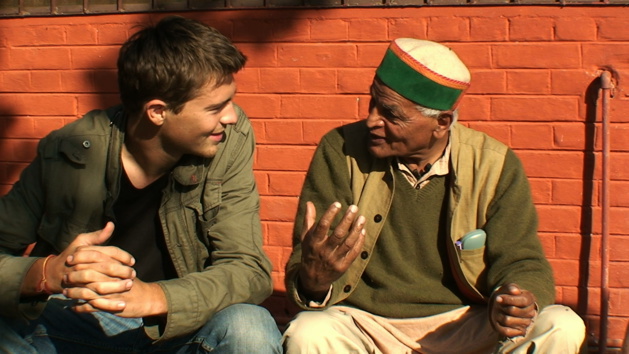
Marc and Satish
Before leaving to India with his childhood friend Nathanaël Coste, Marc de la Ménardière was a business developer for a multinational in New York. His work: to sell French bottles of water and give it the image of a luxurious product. A way of life quite opposed to his friend’s, who became a movie director and producer on environment. In 2008, when Marc broke his foot, confined to bed for two months after an accident, Nathanaël gave him a few documentaries to watch. It is the beginning of a turning point, of a growing awareness. Marc leaves New York and goes on the roads of the world with Nathanaël, looking for sense and new answers.
After this trip, periods of editing and looking for funding, En quête de sens ends up being a one hour twenty minutes movie, with an unexpected success. More than a documentary, it is an ultimate concentration of meetings, often spontaneous, with interlocutors as different as inspiring. Astrophysicists, sociologists, NGO’s CEOs, shamans and activists, all say what they have to say and meet each other to give some leads to understand our complex world. One idea comes out: the occidental society is sick and the interdependence between disciplines is necessary to understand this world, the human experience. For them, the actual economic model is not working anymore, even if it has worked in the past. Marc de la Ménardière explains.
How long did this project with Nathanaël last?
We recorded the first rushes in November 2009. We first left two months and a half to India, then to Mexico, then to the United States. We came home for a while, and then left again, to Latin America mostly. When we definitely came home, it took more time than what we expected to take care of the editing and to find producers, but also to know what we wanted, give the best form we could to the project.
How did it go in New York when you wanted to leave everything behind and go?
It took some time but I was already at the end of a contract, and I had no motivation left to go for another mission. I really wanted to do something else. Sometimes, in New York, I was already wondering about this whole system. I had also lived six months in Bolivia before going to the United States, so I was already aware about that idea saying there is a link with nature that was cut. But then we forget, we want to make money, etc.
The movie was financed by 963 internauts. Do you think it shows a need to see emerge projects more enthusiastic?
Yes, surely. We were actually very surprised: we wanted to raise 12,000 euros to distribute the movie, and we received 40,000! There is a Buddhist proverb saying: “If you have identified a problem, start by giving the solution.” It really is the message of our movie. We find many documentaries giving information and denouncing. They are very useful by the way, but totally alarming, even moralizing sometimes. Most of the time, they give the impression we are powerless with what is happening in front of us, with the ecological problems, the destruction of nature, etc. For us, we wanted to show what is happening with less heaviness and more enthusiasm, showing there are solutions, that things we really happening and that everybody could act.
How did you meet all these interlocutors when you were improvising everything during your journey?
We had a lot of luck at the beginning. Everything started during a seminary in India, where we met the environmental activist Vandana Shiva. Starting from there, we had the chance to meet many other personalities. These meetings led us to give the movie another direction and to keep Cartesian principles away. Indeed, Descartes was wrong about everything after all, when he was reducing the world to a big machine, compartmentalizing everything. These arguments lead to destruction. We wanted to denounce this mechanic intelligence, this separation of things which leads to a totally materialist approach. With Vandana Shiva, we wanted to point out this idea of unity of the living world, of multiple possibilities, that everything is linked.
You gave a voice to very different people and specialists. Was it in order to touch a very large public, or because you needed to adopt different angles?
Most of all, we wanted to show the world we are living in is very complex, but that every discipline is necessary to the other. It is the principle of full thought, which involves not to split up but to find a solution at the crossroads of all those things. We have tried to build the movie around this idea of interdependence, of complementarity, showing that in other places of the world, there are other ways of thinking. Which is why there is a need to talk to all these people, who all have the same conclusions at the end.




























